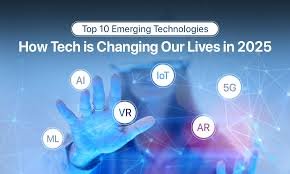In 2025, emerging technologies are no longer confined to the realms of science fiction. They are reshaping our daily experiences, from how we work and communicate to how we shop, travel, and manage our health. These advancements have the potential to improve efficiency, enhance convenience, and solve complex global challenges. This article explores how emerging technologies are transforming everyday life and what the future holds for these innovations.
1. Artificial Intelligence (AI) and Machine Learning: Revolutionizing Personalization
AI and machine learning (ML) are becoming ubiquitous in everyday life, driving personalization and enhancing user experiences across various sectors. From smart homes to online shopping, AI is shaping how we interact with technology.
Key Developments:
-
Personal Assistants: AI-powered virtual assistants like Siri, Alexa, and Google Assistant are getting smarter, offering more personalized services, such as scheduling, reminders, and even emotional support.
-
Smart Homes: AI is at the heart of smart home technology, controlling everything from lighting and heating to security systems. Devices like smart thermostats, refrigerators, and voice-controlled appliances make life more convenient and efficient.
-
Personalized Shopping: Retailers use AI to analyze consumer behavior and offer personalized recommendations based on past purchases and browsing history. Platforms like Amazon and Netflix leverage this technology to suggest products and content tailored to individual preferences.
Why It’s Important:
-
Convenience and Efficiency: AI helps automate daily tasks, saving time and making life more convenient. From setting reminders to adjusting home settings, AI simplifies mundane chores.
-
Better User Experience: AI’s ability to predict and respond to needs in real-time creates a more tailored and satisfying experience for consumers.
2. 5G Connectivity: Enabling Faster Communication and Smarter Devices
5G networks are transforming how we connect to the internet, offering faster speeds, lower latency, and more reliable connections. This technology is crucial in the growing world of Internet of Things (IoT) devices and autonomous systems.
Key Developments:
-
Faster Internet Speeds: 5G provides download speeds up to 100 times faster than 4G, enabling seamless streaming, faster downloads, and lag-free communication in real-time.
-
Smart Cities: With 5G, cities are becoming smarter, with connected infrastructure that improves traffic management, energy consumption, and public safety. For example, smart traffic lights can adapt to traffic conditions, reducing congestion and improving safety.
-
Autonomous Vehicles: 5G is a game-changer for self-driving cars, enabling low-latency communication between vehicles and infrastructure. This is crucial for the safe and efficient operation of autonomous transportation systems.
Why It’s Important:
-
Improved Communication: Faster and more reliable communication enables real-time interactions, whether for business, entertainment, or emergency services.
-
Connected Ecosystems: The low latency and high bandwidth of 5G make it possible to connect more devices simultaneously, creating smarter cities, homes, and vehicles.
3. Augmented Reality (AR) and Virtual Reality (VR): Changing How We Experience the World
AR and VR technologies are transforming how we experience entertainment, education, and even daily tasks. By blending the digital and physical worlds, these technologies offer immersive, interactive experiences that were once unimaginable.
Key Developments:
-
Immersive Gaming and Entertainment: AR and VR are taking gaming to new heights, offering fully immersive experiences. VR headsets, like Oculus Quest and PlayStation VR, allow users to step into virtual worlds for gaming, movies, and live events.
-
Remote Work and Collaboration: VR is changing remote work by providing virtual meeting spaces that feel more interactive and engaging than traditional video calls. Virtual workspaces can be used for training, team collaboration, and presentations.
-
Shopping and Retail: Retailers are using AR to enhance the shopping experience. With AR apps, customers can virtually try on clothes, visualize furniture in their homes, or even test products before making a purchase.
Why It’s Important:
-
Enhanced Learning and Work: AR and VR are creating new ways for people to learn and collaborate remotely, improving productivity and education.
-
Interactive Experiences: These technologies make entertainment and shopping more interactive, creating new ways for consumers to engage with products and experiences.
4. Blockchain Technology: Redefining Security and Trust
Blockchain, the technology behind cryptocurrencies like Bitcoin, is expanding beyond finance and is now being used to enhance security and transparency in various industries.
Key Developments:
-
Digital Identity and Privacy: Blockchain is being used to create secure digital identities, giving individuals more control over their personal information. This has significant implications for privacy and data security.
-
Supply Chain Transparency: Blockchain technology is making it possible to track products from origin to destination, improving transparency and reducing fraud. This is particularly valuable in industries like food, healthcare, and manufacturing.
-
Smart Contracts: Blockchain-based smart contracts enable automated, secure transactions without the need for intermediaries. This technology is being used in sectors like real estate, insurance, and legal services to streamline processes and reduce costs.
Why It’s Important:
-
Security and Privacy: Blockchain enhances the security of digital transactions and personal data, making it harder for hackers to alter information.
-
Transparency and Trust: The transparency provided by blockchain builds trust among consumers and businesses by offering a clear and immutable record of transactions.
5. Robotics and Automation: Streamlining Everyday Tasks
Robots and automation are increasingly becoming part of our everyday lives, from cleaning our homes to assisting in healthcare and service industries.
Key Developments:
-
Home Automation: Robots like Roomba are making household chores easier by automatically vacuuming floors and cleaning surfaces. As robotics technology advances, we can expect even more complex tasks to be handled by automated systems.
-
Healthcare Assistance: In healthcare, robots are being used for tasks ranging from surgeries to patient care. Surgical robots allow for minimally invasive procedures with greater precision, while robots in hospitals assist with deliveries and other routine tasks.
-
Automated Delivery Services: Autonomous robots and drones are already being used for last-mile deliveries. Companies like Amazon and Starship Technologies are using robotic systems to deliver packages and food directly to consumers.
Why It’s Important:
-
Increased Efficiency: Automation saves time and reduces the need for human intervention in repetitive tasks, freeing up time for more complex activities.
-
Improved Accessibility: Robotics make tasks easier for those with mobility issues and offer increased precision in fields like surgery.
6. Biotechnology: Transforming Healthcare and Longevity
Biotechnology continues to evolve, providing breakthroughs that not only improve health outcomes but also extend life expectancy. In 2025, innovations in genetics and molecular biology are drastically improving how we approach healthcare.
Key Developments:
-
Gene Editing: Technologies like CRISPR allow for precise editing of genes, offering potential cures for genetic diseases and advancements in personalized medicine.
-
Wearable Health Devices: Advances in biotechnology have led to the development of wearable health devices that monitor everything from blood sugar levels to heart rate. These devices provide real-time data that can be used to manage chronic conditions.
-
Personalized Medicine: With advancements in genomics, doctors can now tailor treatments to individuals based on their genetic makeup, improving the effectiveness of therapies and reducing side effects.
Why It’s Important:
-
Improved Health Outcomes: Biotechnology is paving the way for more targeted, effective treatments that can cure diseases and manage health conditions more efficiently.
-
Extended Lifespan: The ability to modify genes and offer personalized treatments is increasing human longevity and quality of life.
Conclusion: Emerging Technologies Are Shaping the Future
In 2025, emerging technologies are fundamentally changing how we live and interact with the world. From AI and machine learning to blockchain, robotics, and biotechnology, these innovations are driving transformation across industries and improving our everyday lives. As these technologies continue to evolve, they promise to make life more efficient, connected, and personalized, offering new opportunities to solve global challenges and enhance human well-being. Embracing these technologies will be essential for individuals and businesses to stay competitive and thrive in the future.

